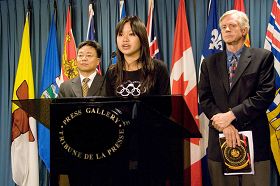(Clearwisdom.net) Canadian representatives for Reporters Without Borders (Reporters sans Frontieres - RSF) held a press conference on July 14, 2008, in Canada. RSF released its investigative report on Eutelsat's attempt to curry favor with the Chinese Communist Party (CCP) and obtaining business benefits by shutting down New Tang Dynasty Television's (NTDTV) broadcasting to Asia using the pretext of a technical problem. RSF also called on the international community, including the Canadian and French governments, to urge Eutelsat to resume NTDTV's regular broadcasting to Asia.
The President of NTDTV Canada, Wang Shaojiu, said that cases of the CCP using television networks to suppress NTDTV have also occurred in Canada. He emphasized that freedom of the press is for everybody.
|
Canadian Chinese at Parliament Hill call on the Canadian Government to urge Eutelsat to resume NTDTV's regular broadcasting to Asia in order to help China achieve freedom of the press |
Buying off communications companies, the CCP intensifies suppression of the media in the run-up to Olympics
Executive director of RSF's Canadian Branch Katherine Borlongan said at the press conference that RSF obtained a recorded conversation between an employee at Eutelsat's Beijing office and an interlocutor whom the employee thought was a Chinese Propaganda Department official on June 23, 2008. The recording shows that Eutelsat's shutdown of NTDTV's signal to Asia was an act "that was premeditated, politically-motivated, and violating the free flow of information and the convention under which Eutelsat operates, " and is "a sounding alarm for infringing upon the freedom of expression."
She said that, unlike other Chinese TV stations, NTDTV has a great deal of coverage of human rights issues, including the repression in Tibet and of religious groups such as Falun Gong and the underground Christian churches. All these subjects are strictly censored in China. Obviously, less than one month ahead of the Olympics, the flow of this free information has become extremely important.
Ms. Borlongan said that if Eutelsat does not immediately resume NTDTV's transmissions to Asia, no TV companies can guarantee that, as Eutelsat customers, they will not be arbitrarily cut off because their programs fail to pass the censorship.
Ms. Borlongan emphasized that when the Chinese government bid to host the Olympics in 2001, it promised freedom of the press, but freedom of the media in China is far from being guaranteed.
President Wang Shaojiu said that the CCP has gone so far as to interfere with NTDTV's business in Canada. He illustrated with an example that a document from the Chinese Embassy said that the Chinese Embassy is trying to influence CRTC (Canadian Radio-television and Telecommunications Commission) and Rochester Cable News Network (CNN) to not broadcast NTDTV programs in Canada.
Former Canadian Secretary of State for Asia-Pacific David Kilgour also attended the press conference. He said that when Eutelsat CEO Mr. Giuliano Berretta attempted to cut off NTDTV's broadcasting to China in 2005, nearly 60 Canadian MPs and senators jointly signed a letter urging him to reverse that decision.
Sacrificing morality for benefits, Eutelsat undermines basic values
An NTDTV viewer and democracy proponent, Shi Xingjian, said that Eutelsat caved in to the CCP, suppressing the freedoms of press and speech for benefits. Its action undermines the basic values of democratic countries. "If Eutelsat does not correct its mistake soon, it will become an accomplice of the CCP."
Wang Shaojiu said at the end of the press conference that China wants to become a strong country in the world, but that a strong country adds prosperity and glory to humanity and the world. "But looking back in history, what happens when you have a strong country without freedom? With our Chinese media, particularly, when we broadcast to China, what we have done is different from Canadian television, such as CTV and CBC. This is important not only for Chinese people, but also for the values of humanity."
Category: April 25 Events







